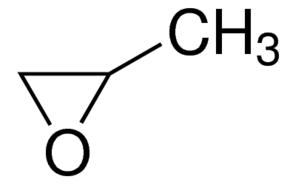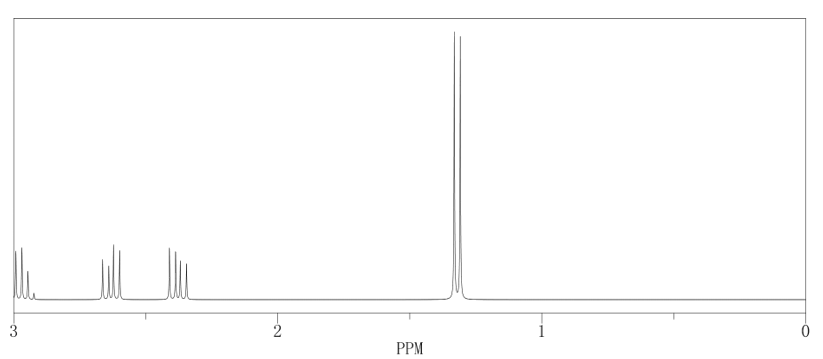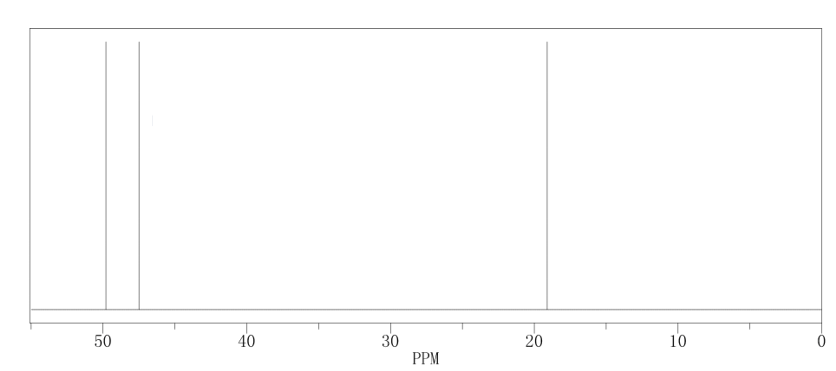Propylene oxide CAS#: 75-56-9; ChemWhat Code: 30501
Identification
| Product Name | Propylene oxide |
| IUPAC Name | 2-methyloxirane |
| Molecular Structure |  |
| CAS Registry Number | 75-56-9 |
| EINECS Number | 200-879-2 |
| MDL Number | MFCD00005126 |
| Beilstein Registry Number | 79763 |
| Synonyms | methyloxirane, Propylene oxide, propyleneoxide;CAS No. 75-56-9 CAS Number: 75-56-9 |
| Molecular Formula | C3H6O |
| Molecular Weight | 58.08 |
| InChI | InChI=1S/C3H6O/c1-3-2-4-3/h3H,2H2,1H3 |
| InChI Key | GOOHAUXETOMSMM-UHFFFAOYSA-N |
| Canonical SMILES | CC1CO1 |
| Patent Information | ||
| Patent ID | Title | Publication Date |
| WO2020/35561 | PREPARATION OF DIESTERS OF (METH)ACRYLIC ACID FROM EPOXIDES | 2020 |
| KR2020/20441 | process for preparing cyclic carbonate using hyper crosslinked polymers and hyper crosslinked polymers for selective formation of cyclic carbonates | 2020 |
| CN109824542 | A process for preparing nitrile γ – of alcohol compound (by machine translation) | 2019 |
| US2019/193063 | CATALYSTS SUPPORTED ON NATURAL POLYMERS FOR THE PRODUCTION OF CARBONATES FROM CO2 | 2019 |
| CN107021933 | Method for synthesizing N – aryl oxazolidine -2 – ketone compound by ionic liquid catalysis (by machine translation) | 2019 |
Physical Data
| Appearance | Colorless, transparent, low-boiling flammable liquid |
| Solubility | 425-450g/l |
| Melting Point, °C |
| -112 |
| -112.95 |
| 34.5 |
| -111.93 |
| -112.13 |
| Boiling Point, °C | Pressure (Boiling Point), Torr |
| 34 | |
| 35 | 760 |
| 34 | 760 |
| 34.5 – 35 | |
| 37 | 756 |
| 33 – 33.5 | 718 |
| 34.23 | 760 |
| -16.66 | 80 |
| 33.9 | 754 |
| Refractive Index | Wavelength (Refractive Index), nm | Temperature (Refractive Index), °C |
| 1.3667 | 589 | 20 |
| 1.3661 | 589 | 20 |
| 1.3638 | 589 | 25 |
| 1.367 | 589 | 19 |
| 1.0465 | 589 | 20 |
| 1.36082 | 589 | 30 |
| 1.368 | 589 | 17 |
| Density, g·cm-3 | Reference Temperature, °C | Measurement Temperature, °C |
| 0.8271 | 4 | 20 |
| 0.83 | 4 | 20 |
| 0.8351 | 4 | 16 |
| 0.8249 | 4 | 25 |
| 0.859 | 0 |
| CO, Rh/SiO2Description (Association (MCS)) | Solvent (Association (MCS)) | Temperature (Association (MCS)), °C | Partner (Association (MCS)) |
| Desorption | NH4Br/g-C3N4 | ||
| Desorption | ZnBr2/g-C3N4 | ||
| Desorption | graphitic carbon nitride | ||
| Further physical properties of the adsorbed molecule | Pd(111) | ||
| Further physical properties of the adsorbed molecule | 199.9 – 399.9 | 20.3 – 600.05 | D2, Pd/SiO2 |
| Further physical properties of the adsorbed molecule | 199.9 – 399.9 | 20.3 – 600.05 | D2, Rh/SiO2 |
| Further physical properties of the adsorbed molecule | 199.9 | 20.3 | Cu(2,4-dichloro-benzoate)2 |
| Adsorption | 174.9 – 199.9 | 49.9 | charcoal |
Spectra
| Description (NMR Spectroscopy) | Nucleus (NMR Spectroscopy) | Solvents (NMR Spectroscopy) | Temperature (NMR Spectroscopy), °C | Frequency (NMR Spectroscopy), MHz |
| Chemical shifts, Spectrum | 1H | chloroform-d1 | 24.84 | |
| Chemical shifts, Spectrum | 1H | chloroform-d1 | 400 | |
| Chemical shifts | 1H | chloroform-d1 | 600 | |
| Spectrum | 1H | chloroform-d1 | 400 | |
| Chemical shifts, Spectrum | 1H | water-d2 | 600 | |
| Chemical shifts | 1H | chloroform-d1 | 24.84 | |
| Chemical shifts, Spectrum | 1H | chloroform-d1 | 20 | |
| Spectrum | 1H | chloroform-d1 | 24.84 | 300 |
| Chemical shifts, Spectrum | 1H | dimethylsulfoxide-d6 | ||
| Spectrum | 1H | chloroform-d1 | 25.04 | 400.1 |
| 2D-NMR, Spectrum | 1H, 1H | 27.84 | ||
| Spectrum | 1H | CDCl3 | 400 | |
| NMR with shift reagents, Chemical shifts | 1H | CDCl3 | ||
| Chemical shifts | 1H | CDCl3 | 25 | 499.88 |
| Spin-spin coupling constants | H2O | 15 | ||
| Chemical shifts | 1H, 13C |
| Description (IR Spectroscopy) | Solvent (IR Spectroscopy) | Temperature (IR Spectroscopy), °C |
| Intensity of IR bands, Bands, Spectrum | -261.16 | |
| Bands, Spectrum | ethanol | -268.96 |
| Bands, Spectrum | potassium bromide | -268.96 |
| Spectrum | various solvent(s) | |
| Spectrum | CCl4 | |
| Spectrum | neat (no solvent) | |
| Spectrum | CS2 | |
| Spectrum | -254.2 |
| Description (Mass Spectrometry) | Comment (Mass Spectrometry) |
| liquid chromatography mass spectrometry (LCMS), electrospray ionisation (ESI), spectrum | |
| gas chromatography mass spectrometry (GCMS), spectrum | |
| spectrum | |
| GCMS (Gas chromatography mass spectrometry) | Fragmentation pattern |
| APCI (atmospheric pressure chemical ionization), IT (ion trap), Spectrum | |
| GCMS (Gas chromatography mass spectrometry), Spectrum |
| Description (UV/VIS Spectroscopy) |
| Absorption maxima |
| Description (ESR Spectroscopy) |
| ESR |
| Description (Raman Spectroscopy) | Solvent (Raman Spectroscopy) | Comment (Raman Spectroscopy) |
| Spectrum | neat liquid | |
| Bands | neat liquid | |
| Spectrum | neat (no solvent) | |
| Degree of depolarization of Raman bands | ||
| Spectrum | ||
| Raman |
Route of Synthesis (ROS)
| Conditions | Yield |
| With pyridine N-oxide; dihydrogen peroxide; methyltrioxorhenium(VII) In methanol; water at 40℃; under 11894.7 – 36201.3 Torr; for 3h; | A 1.02% B 98% |
| With pyridine; carbon dioxide; dihydrogen peroxide; methyltrioxorhenium(VII) In methanol; water at 25 – 40℃; under 36201.3 Torr; for 3h; | A n/a B 60.25% |
| With pyridine N-oxide; carbon dioxide; dihydrogen peroxide; methyltrioxorhenium(VII) In methanol; water at 25 – 40℃; under 36201.3 Torr; for 3 – 9h; | A n/a B 51.1% |
| With pyridine N-oxide; urea hydrogen peroxide adduct; methyltrioxorhenium(VII) In methanol; water at 30℃; under 12929 Torr; |
Safety and Hazards
| Pictogram(s) |     |
| Signal | Danger |
| GHS Hazard Statements | H224: Extremely flammable liquid and vapor [Danger Flammable liquids] H302: Harmful if swallowed [Warning Acute toxicity, oral] H311: Toxic in contact with skin [Danger Acute toxicity, dermal] H319: Causes serious eye irritation [Warning Serious eye damage/eye irritation] H331: Toxic if inhaled [Danger Acute toxicity, inhalation] H335: May cause respiratory irritation [Warning Specific target organ toxicity, single exposure; Respiratory tract irritation] H340: May cause genetic defects [Danger Germ cell mutagenicity] H350: May cause cancer [Danger Carcinogenicity] Information may vary between notifications depending on impurities, additives, and other factors. |
| Precautionary Statement Codes | P201, P202, P210, P233, P240, P241, P242, P243, P261, P264, P270, P271, P280, P281, P301+P312, P302+P352, P303+P361+P353, P304+P340, P305+P351+P338, P308+P313, P311, P312, P321, P322, P330, P337+P313, P361, P363, P370+P378, P403+P233, P403+P235, P405, and P501 (The corresponding statement to each P-code can be found at the GHS Classification page.) |
Other Data
| Transportation | Class 6.1; Packaging Group: II; UN Number: 2671 |
| Under the room temperature and away from light | |
| HS Code | 290621 |
| Storage | Under the room temperature and away from light |
| Shelf Life | 1 year |
| Market Price | USD 45/kg |
| Druglikeness | |
| Lipinski rules component | |
| Molecular Weight | 58.08 |
| logP | 0.27 |
| HBA | 1 |
| HBD | 0 |
| Matching Lipinski Rules | 4 |
| Veber rules component | |
| Polar Surface Area (PSA) | 12.53 |
| Rotatable Bond (RotB) | 0 |
| Matching Veber Rules | 2 |
| Bioactivity |
| In vitro: Efficacy |
| Quantitative Results |
| Parameter | Value (qual) | Value (quant) | Unit | Target |
| Activity(Compound Specificity) | = | 0.18 | µmol/min | Glutathione S-transferase Mu 1 [rat]:Wild |
| Activity(Compound Specificity) | = | 0.09 | µmol/min | Glutathione S-transferase Mu 4 [rat]:Mutated |
| Vmax | = | 9.66 | mM/min | Lipase B, Lysosomal Acid [Candida antarctica]:Wild |
| Km (Michaelis constant) | = | 573.1 | mM | Lipase B, Lysosomal Acid [Candida antarctica]:Wild |
| Quantitative Results | ||
| 1 of 7 | Target | Lipase B, Lysosomal Acid [Candida antarctica]:Wild |
| Biological material | Candida antarctica | |
| Assay Description | Enzyme activity of Candida antarctica lipase B upon incubation with compound in the presence of Ammonium sulfate | |
| Results | ENZYMATIC ACTIVITY not calculated | |
| Measurement | enzymatic activity | |
| 2 of 7 | Target | Lipase B, Lysosomal Acid [Candida antarctica]:Wild |
| Biological material | Candida antarctica | |
| Assay Description | Enzyme activity of Candida antarctica lipase B upon incubation with compound in the presence of Ammonium sulfate and Triton X-100 | |
| Results | ENZYMATIC ACTIVITY not calculated | |
| Measurement | enzymatic activity | |
| 3 of 7 | Target | Lipase B, Lysosomal Acid [Candida antarctica]:Wild |
| Biological material | Candida antarctica | |
| Assay Description | Maximum velocity of the compound towards Candida antarctica lipase B with respect to Michaelis constant | |
| Results | VMAX/KM not calculated | |
| Measurement | Vmax/Km | |
| 4 of 7 | Target | Lipase B, Lysosomal Acid [Candida antarctica]:Wild |
| Biological material | Candida antarctica | |
| Assay Description | Enzyme activity of Candida antarctica lipase B upon incubation with compound in the presence of 1,2-dimethoxyethane and 18-crown-6 | |
| Results | ENZYMATIC ACTIVITY not calculated | |
| Measurement | enzymatic activity | |
| 5 of 7 | Target | Lipase B, Lysosomal Acid [Candida antarctica]:Wild |
| Biological material | Candida antarctica | |
| Assay Description | Enzyme activity of Candida antarctica lipase B upon incubation with compound in the presence of 1,2-dimethoxyethane | |
| Results | ENZYMATIC ACTIVITY not calculated | |
| Measurement | enzymatic activity | |
| 6 of 7 | Target | Lipase B, Lysosomal Acid [Candida antarctica]:Wild |
| Biological material | Candida antarctica | |
| Assay Description | Enzyme activity of Candida antarctica lipase B upon incubation with compound in the presence of Ammonium sulfate and 18-crown-6 | |
| Results | ENZYMATIC ACTIVITY not calculated | |
| Measurement | enzymatic activity | |
| 7 of 7 | Assay Description | Lipophilicity of the compound was measured by octanol/water partition coefficient |
| Measurement | Lipophilicity of the compound was measured by octanol/water partition coefficient |
| Toxicity/Safety Pharmacology |
| Quantitative Results |
| Parameter | Value (qual) | Value (quant) | Unit |
| LD50 | = | 150 | mg/kg |
| LD50 | = | 6600 | mg/kg |
| LD50 | = | 1500 | mg/kg |
| LD50 | = | 380 | mg/kg |
| Qualitative Results | ||
| 1 of 5 | Biological material | guppy |
| Assay Description | Aquatic toxicity of the compound in Poecilia reticulata | |
| Measurement | Aquatic toxicity | |
| 2 of 5 | Biological material | rat |
| Assay Description | Lowest effective dose for in vivo genotoxicity in rat;Oral | |
| 3 of 5 | Biological material | rat |
| Assay Description | Carcinogenic dose descriptor in male rat;Oral | |
| 4 of 5 | Biological material | dog |
| Assay Description | Inhalation lethal dose;Inhalation | |
| 5 of 5 | Biological material | dog |
| Assay Description | Lowest published lethal concentration;Inhalation |
| Use Pattern |
| Propylene oxide CAS#: 75-56-9 Chemical processes/laboratory use |
| method for synthezing cyclic carbonate with reacton with carbon dioxide with of silica gel-immobilize phosphonium salt halide as catalyst |
| starting material for producing a hydroxyalkyl acrylate by reaction with acrylic acid in the presence of a catalyst |
| Extractive agent for separation of E-1,1,1,2,3-pentafluoropropene (E-HFC-1225ye) |
| Agricultural processing |
| Ancient defense polymer to resist infection |
| component of a composition for stimulating the interruption of dormancy of the buds of fruit-bearing plants |
| Nonionic dispersing agent |
| base for synthesis of the compounds of present invention |
Buy Reagent | |
| No reagent supplier? | Send quick inquiry to ChemWhat |
| Want to be listed here as a reagent supplier? (Paid service) | Click here to contact ChemWhat |
Approved Manufacturers | |
| Watsonnoke Scientific Ltd | http://www.watsonnoke.com/ |
| Want to be listed as an approved manufacturer (Requires approvement)? | Please download and fill out this form and send back to approved-manufacturers@chemwhat.com |
Other Suppliers | |
| Watson International Limited | Visit Watson Official Website |
Contact Us for Other Help | |
| Contact us for other information or services | Click here to contact ChemWhat |




